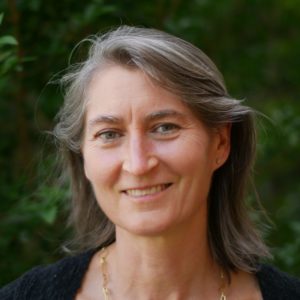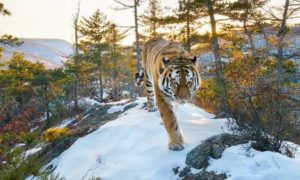Event Cinema
Wednesdays for the Planet | Our Planet – Forests
Wednesdays for the Planet is a series of online screenings and virtual presentations with experts highlighting the natural world and other environmental challenges our planet faces. The virtual screenings are for educational purposes, non-profit and non-commercial.
As part of the European Forest Week from 2-6 November 2020 and in partnership with WWF and the joint UNECE/FAO Forestry and Timber Section, we hosted a virtual discussion on the Forests episode from the award-winning docuseries Our Planet.
Film: Our Planet | Forests
Our Planet is an eight-part docuseries that explores the unique and precious wonders of our natural world. The docuseries combines stunning photography and technology with an unprecedented, never-before-filmed look at the planet’s remaining wilderness areas and their animal inhabitants. The ambitious four-year project has been filmed in 50 countries across all the continents of the world, with over 600 members of crew capturing more than 3,500 filming days, focusing on the breadth of diversity of habitats around the world, from the remote Arctic wilderness and mysterious deep oceans to the vast landscapes of Africa and diverse jungles of South America.
Narrated by Sir David Attenborough, Our Planet is a groundbreaking collaboration between WWF, Netflix and Silverback Films. It has also won two Emmy awards for Outstanding Documentary Series and Outstanding Narrator.
Episode: Forests
In the episode Forests, examine the fragile interdependence that exists between forests’ wide variety of residents, including bald eagles, hunting dogs and Siberian tigers.
We are uniquely reliant on forests – without them, life as we know it would not exist. We’ve exploited our forests through the ages, but if we give them the chance, they will bounce back.
Experts

Fran Price
Global Forest Practice Leader at WWF International

Alicja Kacprzak
Forestry Officer at the Food and Agriculture Organisation of the United Nations
Alicja Kacprzak is a Forestry Officer at the Food and Agriculture Organisation of the United Nations. She specialises in the bio- and circular economy, sustainability, employment and gender equality. Prior to joining the United Nations, she worked at the World Economic Forum on environmental initiatives such as green growth, climate change and renewable energies. She also worked in the food processing industry and in the reuse and recycling of organic resources from bio-based industries.
Virtual Discussion
On Wednesday, 4 November, at 13:30 (CET), the virtual discussion took place on Webex and Facebook Live.
Online Screening
Viewers are invited to watch the documentary online prior to the live virtual discussion. Please click on the link below to view the documentary.
Summary
Fran Raymond Price, Global Forest Practice Leader, WWF International
- Deforestation and forest degradation continue with record levels of fires
- Covid-19 symptomatic of our broken relationship with nature, including how forests are managed
- Habitat loss, including deforestation, is a leading cause of the decline in wildlife populations
- Commercial agriculture is largest driver of deforestation, in addition to logging, human migration and population increases, extractive industries (mining, oil and gas), transport and infrastructure projects and expanding towns and cities.
- Forests underpin every aspect of our societies and economies: our health, wealth and well-being depend upon the goods and services that forests provide. Forests are home to more than half of the world’s terrestrial biodiversity and, globally, roughly 1.2 billion people live in and around forests and depend on forests for their livelihoods, food, fodder, shelter, energy, medicine and income generation
- It is possible to protect forests and the unique wildlife that live in them while meeting peoples’ needs.
- WWF envisions a world enriched by extensive, resilient forest landscapes benefiting biodiversity, people and climate. It works to abate the threats to forests through improved policy frameworks in producer and consumer countries, including subsidies, taxes, etc.; land use planning and tenure clarification/recognition of IPLCs in producer countries; working with corporate supply chains and beyond; agricultural intensification; consumer focused campaigns; and landscape/jurisdictional approaches. It also advocates for the proper valuing of forests, well-managed working forests, community forests and forestry, Payments for Ecosystem Services (water, forest carbon, etc), integrating Forest Landscape Restoration into management and works on Forests Forward.
- Protected and Conserved Areas (PCAs), including Indigenous and Community Conserved Areas, are one of the most effective tools for preventing loss of natural ecosystems and species, as well as to achieve long-term sustainable development. In some regions, PCAs are the center of economic development, through tourism and sustainable use of resources. PCAs also contribute to food security through maintenance of the ecosystem services that support agriculture. PCAs also have a major role to play in climate resilience, both by storing and sequestering carbon, and by ensuring that ecosystems continue to provide goods and services to human societies.
- Governments and corporations need to put in place policies and actions to stop deforestation.
- Our broken food system must be addressed: Production techniques must change and consumption needs to be made more sustainable.
- Support/reward/compensate actions that conserve forests and improve management, local communities need to be empowered, and forest landscape restoration must be accelerated.
Alicja Kacprzak, Forestry Officer at the Food and Agriculture Organisation of the United Nations
- The global forest coverage today is 4 billion hectares, 31% of land area
- Deforestation is a fact. Since 1990, the global forest area declined by 178 million hectares. However, not ALL tree-cutting is deforestation such as forest cleaning for fire prevention, cutting pest infected trees, cutting damaged trees after natural disaster, removing trees in urban space, cutting trees to produce wood-based products. But clear cutting is not acceptable.
- We can prevent deforestation through reforestation, afforestation, landscape restoration, sustainable forest management, and forest management plans.
- More than 700 million hectares – 18 % of global forest area – are legally protected forests.
- There are opportunities for forest-based industries but there are also challenges with sourcing, production and consumption. Unfortunately, furniture has become a fashion victim and cellulose-based fibers are used in fast fashion.
- There are sustainability challenges with cellulose-based bio-plastics with confusion about labels and standards. Not all bio-based plastics decompose into the natural environment. Some need industrial conditions (high-temperature, high-pressure). In addition, collection and industrial composting infrastructure are not yet developed.
- Consumers are encouraged to buy less and purchase certified wood, recycled paper, solid wood, second hand, cellulose-based clothes/fabrics and bio-plastics. We should also repair furniture/clothes, support eco-design (e.g. standardized modules, pure wood products), recycle and compost as much as possible.
Links
- Our Planet | Official Website
- Our Planet | WWF
- Our Planet | Netflix
- Our Planet | IMDB
- Wednesdays for the Planet

